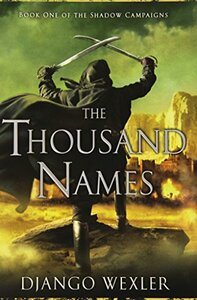Take a photo of a barcode or cover
An early gunpowder military story with relatively small fantasy elements. Pretty much it was war from start to end and not too badly done if you like that sort of thing, which I really don't. And I really didn't buy into the fantasy elements or the world at large. It was actually written pretty well, which is good because otherwise it didn't feel all that original.
Solid fantasy with a big focus on military operations with muskets and cannons. Usually I'm not a fan of fantasy with advanced weapons like this, especially when it comes with only a teaspoon of magic. The meticulous writing style was all right, although sometimes the detailed (and seemingly authentic) fighting action did drag on for my personal taste. The characters were easy to like and their interactions and secrets exciting.
adventurous
dark
funny
tense
slow-paced
Plot or Character Driven:
A mix
Strong character development:
Yes
Loveable characters:
Yes
Diverse cast of characters:
Yes
Flaws of characters a main focus:
No
For the first half the book, i found it hard to form a connextion with the characters. Great action scenes, but it felt like the characters were just forced along without any say due to the military setting.
I think The Thousand Names can best be summed up as “Sharpe does Napoleon’s Egyptian campaigns with a dash of Indiana Jones”. It’s a pretty low-fantasy story, at least for the first three-quarters of the book, focusing mainly on the day-to-day life of soldiers in a desert campaign. The tech level of the setting is roughly equivalent to late 18th/early 19th century Europe, with armaments including muskets, bayonets and a variety of cannon.
The star character has to be Winter Ihernglass, a young woman doing the historically well-attested thing of disguising herself as a man in order to join the army. As someone who has written a character very much like this, I enjoyed seeing Wexler’s take on the theme. Winter is hardy, resourceful and determined, but we never forget how vulnerable she is (though thankfully without any rape!); a truly strong female character who feels utterly realistic.
By contrast Captain Marcus d’Ivoire feels a little bland, but that may be because he has a lot less at stake. Sure, he’s under constant threat of death in battle, but so is everyone else. It isn’t until close to the end of the book, when he begins to suspect there are skeletons in his own family closet, that there’s a reason to think he might have an interesting personal arc ahead of him.
The book itself is something of a slow burn, and the second quarter consists almost entirely of a detailed account of a battle between the colonials and the rebels. Although I’ve studied a little military history, I’ve never gone into the minutiae of battle manoeuvres so I found these scenes hard work, trying to visualise all the details of the terrain and the troop deployments. Hence although these chapters are well-written, I confess I was relieved when the scale switched back to the individual characters’ level.
One thing that did slightly bother me was the worldbuilding. Despite its Afghan-sounding name Khandar is pretty much your standard North African/Near Eastern stereotype, with its self-centred puppet prince and his colonial allies ousted by a coalition of his own army and a bunch of religious fanatics, not to mention horse-riding desert raiders led by a mysterious masked character (The Desert Song, anyone? Or am I the only one old enough to remember that musical?). None of these elements is bad in itself, but together they feel a bit too much of a coincidence. Wexler tries to get away from identifying them racially as Arabs by giving them greyish skin, but it’s such a minor difference (and being visual, too easy to ignore in a book) that it feels like a token effort. Perhaps if we’d seen more of the Khandarai than their magic, there would have been enough cultural differences to throw the stereotypes into the shade, but the reader can only go by what’s on the page.
Flaws aside, this was a great book; it’s always a good sign when I find myself really looking forward to my next reading session. Like Brian McClellan, Wexler has released a prequel short story (“The Penitent Damned”), which I will definitely be checking out whilst I wait for the sequel, The Shadow Throne.
The star character has to be Winter Ihernglass, a young woman doing the historically well-attested thing of disguising herself as a man in order to join the army. As someone who has written a character very much like this, I enjoyed seeing Wexler’s take on the theme. Winter is hardy, resourceful and determined, but we never forget how vulnerable she is (though thankfully without any rape!); a truly strong female character who feels utterly realistic.
By contrast Captain Marcus d’Ivoire feels a little bland, but that may be because he has a lot less at stake. Sure, he’s under constant threat of death in battle, but so is everyone else. It isn’t until close to the end of the book, when he begins to suspect there are skeletons in his own family closet, that there’s a reason to think he might have an interesting personal arc ahead of him.
The book itself is something of a slow burn, and the second quarter consists almost entirely of a detailed account of a battle between the colonials and the rebels. Although I’ve studied a little military history, I’ve never gone into the minutiae of battle manoeuvres so I found these scenes hard work, trying to visualise all the details of the terrain and the troop deployments. Hence although these chapters are well-written, I confess I was relieved when the scale switched back to the individual characters’ level.
One thing that did slightly bother me was the worldbuilding. Despite its Afghan-sounding name Khandar is pretty much your standard North African/Near Eastern stereotype, with its self-centred puppet prince and his colonial allies ousted by a coalition of his own army and a bunch of religious fanatics, not to mention horse-riding desert raiders led by a mysterious masked character (The Desert Song, anyone? Or am I the only one old enough to remember that musical?). None of these elements is bad in itself, but together they feel a bit too much of a coincidence. Wexler tries to get away from identifying them racially as Arabs by giving them greyish skin, but it’s such a minor difference (and being visual, too easy to ignore in a book) that it feels like a token effort. Perhaps if we’d seen more of the Khandarai than their magic, there would have been enough cultural differences to throw the stereotypes into the shade, but the reader can only go by what’s on the page.
Flaws aside, this was a great book; it’s always a good sign when I find myself really looking forward to my next reading session. Like Brian McClellan, Wexler has released a prequel short story (“The Penitent Damned”), which I will definitely be checking out whilst I wait for the sequel, The Shadow Throne.
adventurous
mysterious
medium-paced
Plot or Character Driven:
A mix
Strong character development:
Yes
Loveable characters:
Yes
Diverse cast of characters:
Yes
Flaws of characters a main focus:
No
Graphic: Death, Gun violence, Violence, Blood, Colonisation, War
Moderate: Alcoholism, Gore, Racial slurs, Xenophobia, Medical content, Injury/Injury detail
Minor: Rape, Sexual content, Sexual violence, Torture, Suicide attempt, Fire/Fire injury
Loveable characters:
Yes
The Thousand Names is one of the most interesting fantasy books that I have read in a while.
At surface level, The Thousand Names doesn't read like a fantasy book at all. In fact, at multiple points throughout, I had to remind myself exact what I was reading. The first entry in The Shadow Campaigns series follows the Vordanai army as it marches through the Khandarai desert, as they try to reclaim the city of Ashe-Katarion from an army of religious zealots.
The bulk of the book reads as a stereotypical war novel; battles come often, and are descriptive while still retaining accessibility. I have very little experience with military or war stories, and at no time reading did I feel lost. Differing POV's do an excellent job of telling a complete, balanced story, alternating between the officer ranks and the infantrymen. Being the first in a series of five books, the ending feels like a reasonable conclusion, with a tease of what may come, rather than a blatant cliff-hanger.
I have very few complaints about The Thousand Names, but a few complaints do exist. To the reader who loves epic world-building, be prepared to be frustrated. The Thousand Names is very exposition-lite; we find ourselves thrust into the story, and tidbits of the living world are discovered as the main characters do. As previously mentioned, The Thousand Names is a fantasy book that is light on the fantasy. While magic is teased throughout the novel, we are bereft of it in substantial amounts until the final stretch of the book. The magic system itself feels under-explained, and magic users feel more like X-Men than powerful mages.
The Shadow Campaigns starts out with a strong first entry, and I am excited to see where the author will go from here.
At surface level, The Thousand Names doesn't read like a fantasy book at all. In fact, at multiple points throughout, I had to remind myself exact what I was reading. The first entry in The Shadow Campaigns series follows the Vordanai army as it marches through the Khandarai desert, as they try to reclaim the city of Ashe-Katarion from an army of religious zealots.
The bulk of the book reads as a stereotypical war novel; battles come often, and are descriptive while still retaining accessibility. I have very little experience with military or war stories, and at no time reading did I feel lost. Differing POV's do an excellent job of telling a complete, balanced story, alternating between the officer ranks and the infantrymen. Being the first in a series of five books, the ending feels like a reasonable conclusion, with a tease of what may come, rather than a blatant cliff-hanger.
I have very few complaints about The Thousand Names, but a few complaints do exist. To the reader who loves epic world-building, be prepared to be frustrated. The Thousand Names is very exposition-lite; we find ourselves thrust into the story, and tidbits of the living world are discovered as the main characters do. As previously mentioned, The Thousand Names is a fantasy book that is light on the fantasy. While magic is teased throughout the novel, we are bereft of it in substantial amounts until the final stretch of the book. The magic system itself feels under-explained, and magic users feel more like X-Men than powerful mages.
The Shadow Campaigns starts out with a strong first entry, and I am excited to see where the author will go from here.
The story was incredibly interesting, but I think at least 1/3 of the book could have been edited out. There was excruciating detail given to battles and maneuvers that really did very little other than take up pages.



